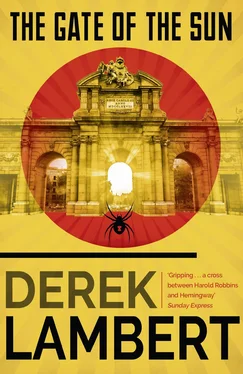‘My motives? Sure I did. I figure there’s a bit of the adventurer or the martyr in any foreigner fighting here.’
‘But our motives, surely, are stronger than self glory or self pity?’ His voice sounded anxious.
‘Oh sure. In my case anyway. I can’t speak for everyone. There are a few phonies here, you know.’
‘You think I’m one?’
‘I think you go looking for arguments.’
‘I can’t stand dogma. But you’re right, I’m too argumentative. It had me worried for a while. I wondered whether I was championing a cause out of perversity.’
‘Not you,’ Tom said. He had known this man for a long time – the frown as he interrogated himself, the dawning smile as he called his own bluff.
‘Then I had a letter from my sister.’
Tom waited; there is a time for waiting and when you knew someone as well as he knew Adam Fleming you knew that this was just such a time.
‘They killed her husband.’
‘Bastards.’
‘Then I knew I had to come here. I wish I’d come before I needed proof.’
‘You would have come anyway,’ Tom said.
‘But you didn’t need a push.’
‘Try living in a company shack in a coal town,’ Tom said. ‘Try busting your ass in the dust bowl of Oklahoma.’
He sensed that what he had said was grotesquely wrong but he couldn’t fathom why. Surely it was feasible to compare injustices in the United States with those of Spain. I knew a great injustice was being perpetrated . Those were Adam Fleming’s very words.
But such is the spontaneity of relationships such as this that anticipation is everything. No need to tell a joke: just point the way. No need to say goodbye: there is farewell in your greeting.
And now Tom Canfield knew.
He said, ‘Your sister, where was her husband killed?’
‘In Madrid,’ said Adam who, of course, knew by now.
‘But you’re holding a Russian rifle.’
‘And you’re wearing a German flying jacket.’
‘I took my rifle from the body of a dead Republican.’
‘I bought my flying jacket in a discount store in New York.’
Delgado said from the lip of the shell-hole, ‘I am delighted to see, Fleming, that you have taken a prisoner.’
Able Seaman Thomas Emlyn Jones, RN, was a man of many talents. He could sing like a chorister, pluck pennies from the ears of children visiting his ship, arm-wrestle a dockside bruiser into submission, summon delicate fevers when threatened with onerous duties and tune the Welsh lilt in his voice on to a wavelength that could cajole girls from Portsmouth to Perth into committing perilous indiscretions.
But midwifery was not one of his accomplishments. When Martine Ruiz emerged from a cabin on HMS Esk , swathed in a sheet, hand supporting her considerable belly, and said, ‘Please help me, I’m having a baby,’ he was unnerved.
He had watched her board the destroyer with the other refugees at the palm-fringed port of Alicante at dusk and she had reminded him of a galleon in full sail, so stately in her bearing that nothing untoward could possibly happen in the immediate future. Now here she was, alarm bells sounding.
His first instinct was to run on his bandy miner’s legs to the sickbay to get help but the Esk had paused north of Alicante to pick up wounded refugees from a moonlit beach, and the ship’s surgeon and his assistants were busily and bloodily engaged. In any case the woman wouldn’t let go of him.
Pulling him into the cabin, she lay on the bunk and said, ‘It is happening,’ as indeed it seemed to be, belly convulsing, body heaving, hands white-knuckled.
Hot water and towels: those, Taffy Jones remembered, were the essentials. He had observed them being taken into the bedroom in the dark and crouching cottage in the Rhondda Valley when his exhausted mother was giving birth to one of his sisters; he had heard the doctor calling for them in the sort of movie where the heroine collapses in a snowstorm and gives birth to twins.
The woman on the bunk screamed.
He turned on the hot water in the wash-basin and grabbed the towels from the rack.
‘There, there, lovey,’ he said, ‘everything will be all right, just you see.’ He held her hand and she gripped it with a fearful strength.
What now? ‘Push,’ he said as the midwife, who smelled of gin, had said to his mother. ‘Push, that’s it, lovey, you just help her on her way,’ because he had no doubt in his mind that a lady was about to be added to the passenger list.
He bathed her sweating face with a towel, not too hot, and laid another across her labouring belly. Observing her agony, hearing her cry, he determined that in future he would be more considerate towards women. No more buns in the oven for Taffy Jones.
The sheet slipped away and a head emerged from between her wide-flung thighs. ‘Push,’ he said gently, ‘push,’ although whether he was addressing mother or child he couldn’t say. What did you do when the baby finally made it? All you heard in the movies was a plaintive squawk from behind closed doors.
‘There, there, lovey, she’s on her way.’
The fingers of Martine Ruiz gripped his hand like talons. She said, ‘You will have to help.’
He stared at the baby; it seemed to have given up the struggle. Perhaps it didn’t like what it saw. He placed two paws round the tiny shoulders and pulled very gently; when he got back to Cardiff he would marry the girl who worked in the newsagents and they would take out a mortgage on a £600 semi and have two kids.
The baby, creased and slippery with mucus and blood, swam forward. Taffy Jones, aware of unplumbed emotions stirring within him, sighed. ‘She’s almost there,’ he said softly. ‘Almost there.’
‘In my bag,’ Martine Ruiz whispered in her accented English that he found difficult to understand. ‘A pair of … scissors.’
He opened her expensive-looking handbag and took them out. The cord had to be cut and knotted; that was it. The prospect didn’t alarm him: authority had settled comfortably upon him.
He dipped the blades of the scissors into the hot water, snipped the cord with one deft cut and tied it. Then he examined the baby.
‘It’s a girl,’ he told Martine Ruiz.
But it was making no sound. Was it breathing? He picked it up in his big hands and anxiously held it aloft. A smack followed by a squawk, he remembered.
‘Come on, you little bugger,’ Taffy Jones pleaded.
Still holding the baby in one paw, he ran the fingers of the other down its flimsy ribs.
And the baby laughed. Taffy Jones swore to it then and many times later in dockside bars where normally midwifery doesn’t rate high in conversational priorities. Some might have mistaken that first utterance for a whimper but Taffy knew better. He was there, wasn’t he? ‘Made a contribution to medical science, perhaps. To mankind, maybe,’ and, if it was his round, his drinking friends would nod sagely.
At the time Taffy Jones merely smiled at the baby who was now making noise that could, perhaps, be mistaken for crying and cooed, ‘Oh, you little bugger you.’
He gently washed the baby and handed it to its mother.
Ana Gomez worried. Not at this moment about her husband who was fighting at Jarama but about the future he was fighting for.
In the Plaza de España in Madrid, close to the front line, she watched Pablo kicking a scuffed football near the waterless fountains and Rosana making a sketch of the statue of Don Quixote.
Pablo intended one day to play for Real Madrid; Rosana to have her pictures hung in the Prado. Or would he, perhaps, play for Moscow Dynamo while Rosana exhibited in the Pushkin Museum?
This was what worried Ana as she paused in the hesitant sunshine on her way to hear her cousin Diego, an orator if ever there was one, speak in a bombed-out church off the Gran Via.
Читать дальше












